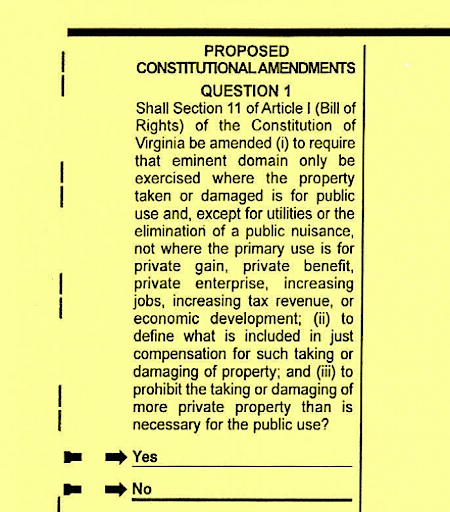UVA Law School’s Julia D. Mahoney has an interesting paper on the fallout and legacy of the Kelo decision: Kelo’s Legacy: Eminent Domain and the Future of Property Rights. Here is the abstract:Judging from the furious public response, one might imagine that Kelo v. New London, which upheld the condemnation of homes for mixed-use redevelopment, represented the abdication of judicial oversight of legislative and administrative decisions to condemn property for ostensible “public use”. Yet, if anything, the opposite is true. The Court’s leading precedents prior to Kelo mandated near total judicial deference to condemnation decisions. By contrast, the majority opinion in Kelo implied, and the one concurring opinion — written by a member of the majority–underscored, that the “public use” limitation constitutes a real check on exercises of government power. Increased judicial oversight could yield benefits. Even though courts may not be superior–or even equal to– legislatures and agencies in their capacity to grapple with the complex moral and economic issues involved in eminent domain, the fact that courts may veto condemnations can serve as a powerful check on undesirable behavior.Hat tip to the Property Prof Blog.
you searched for kelo
Kelo Backlash Could Lead to Restoration of Property Rights Lost to Smart Growth and Eminent Domain Abuses
I haven’t read this yet, but will this evening – from the Heritage Foundation.
Question 1 on the Virginia Ballot – Eminent Domain
(the above is from the Albemarle County site)
“Shall Section 11 of Article I (Bill of Rights) of the Constitution of Virginia be amended (i) to require that eminent domain only be exercised where the property taken or damaged is for public use and except for utilities or the elimination of a public nuisance, not where the primary use is for private gain, private benefit, private enterprise, increasing jobs, increasing tax revenue, or economic development; (II) to define what is included in just compensation for such taking or damaging of property; and (iii) to prohibit the taking or damaging of more private property than is necessary for the public use?”
Property rights. + The Virginia Constitution. + Election Day.
Brings us to Question 1 on the ballot.
Read now so that you know what you’re voting for.
Eminent domain matters. Restricting the government’s ability to take private property for purposes they deem fit is crucial to ensuring individuals’ property rights. That said (and I’m no legal scholar) …
– I’m curious what constitutes “public nuisance”
– “Just compensation” can be a negotiable thing. (the City of Charlottesville nearly used eminent domain recently in Fry’s Spring)
You might have already made up your mind on whom to vote for President, but I’d wager few have heard of Question 1 on the Virginia Ballot this year; I didn’t know until recently. (while you’re reading, find out what else is on the ballot)
Ilya Somin writes at the Volokh Conspiracy (read the whole thing):
Twitter Week in Review
Rethink the Season of Giving http://post.ly/D9qJ # @RealtorToby 34 days until the Day After Christmas. in reply to RealtorToby # RT @calculatedrisk: More on Strategic Defaults http://bit.ly/5r5L8h [we're just getting started, I think] # Watched…
Perhaps my favorite post of the week – referencing eminent domain
Referencing eminent domain and the Kelo case:Here is my house that you did takeFrom me to you, this spell I makeYour houses, your homesYour family, your friendsMay they live in miseryThat never ends.I curse you allMay you rot in hellTo each of youI send this spellFor the rest of your livesI wish you illI send this nowBy the power of willThanks to Homeland Stupidity.This is the Virginia General Assembly’s most recent attempt to curtail Eminent Domain.Constitutional amendment (first resolution); exercise of eminent domain powers. Prohibits the taking of private property by eminent domain for the predominant use of any private person or entity or for the transfer of ownership to any private person or entity. Further defines the permissible public uses for which property may be taken and the “just compensation” that must be paid for the property taken. The proposed amendment specifies that it is a judicial question whether private property is being condemned for a permissible public use.
Links for 10 November 2006
Power, quality of life and broadbandWe live in publicWhat real people use on the webDo real estate agents have a secret agenda? Um, some do.
Morning links 11-06-06
The power of reputationPart 1 – it’s the relationship, stupidA Kelo blowback on Tuesday?Just because it took me so long to re-find out how to set my mac’s time to military (24-hour) time, this is the link to the solution.Draft your own Fantasy Congress!A real estate reason to vote “No” on Amendment No. 1Urban Development Areas – not a bad idea. Now, as far as the implementation …

